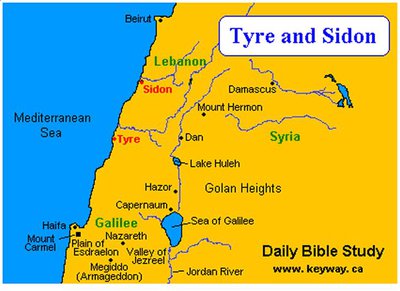Thoughts for the Day
Thursday, 13th February 2025: On the look out for God's work
Mark 7 Matthew 15 Messiah Kingdom of God Healing
Reading : Verses from Mark, Chapter 7

From there he set out and went away to the region of Tyre. He entered a house and did not want anyone to know he was there. Yet he could not escape notice, but a woman whose little daughter had an unclean spirit immediately heard about him, and she came and bowed down at his feet. Now the woman was a Gentile, of Syrophoenician origin. She begged him to cast the demon out of her daughter. He said to her, ‘Let the children be fed first, for it is not fair to take the children’s food and throw it to the dogs.’ But she answered him, ‘Sir, even the dogs under the table eat the children’s crumbs.’ Then he said to her, ‘For saying that, you may go—the demon has left your daughter.’ So she went home, found the child lying on the bed, and the demon gone.
(Lectionary, New Revised Standard Version)
Thoughts
The story of the healing of the Syrophoenician woman's daughter appears only in Mark and Matthew's Gospels (Matthew 15.21-28) although in the latter she is called by the old-style name "a Canaanite woman" which goes back centuries to when Abraham arrived in the area. At the time of Jesus, though, the Canaanites had mostly left and this was Phoenician country with two large port cities of Tyre and Sidon. In both Gospels Jesus has been challenged by the Jewish leaders sent from Jerusalem to report on him and the opposition had grown more vociferous. As a consequence he moves north, some fifty miles from Capernaum, into the Gentile region of Tyre and Sidon. Here he can teach his disciples in relative peace without thousands of people following him.
Jesus' words to the woman are stern, but he knows his time is limited, and that he is called to be the Messiah for the Jews. However, her determination wins through, and he does heal her daughter. The most unusual thing about this incident, though, is that Jesus although unrecognized by Israel's leaders is recognised immediately as the Messiah by a pagan woman. In Matthew's Gospel she calls him "Lord, Son of David" the traditional titles for the Messiah.
In this incident we see a foretaste of what was to happen after Jesus' resurrection. Jesus would largely be denied by his own people, but be recognised by the Gentile world. Today, in our world we should take this example to heart and be on the lookout for how God works in places and ways we don't expect. Sometimes when we are 'tuned in' to God we will hear His voice from outside the Christian community - from our secular society.
Prayer
Lord Jesus Christ
help us to recognise Your voice
in places where we don't expect it.
May we learn to hear Your still small voice
amid the noise and chaos of our world,
and may we respond to Your call
to work for Your Kingdom in the world.
Amen.
You might like to look at this short piece put out by The Henri Nouwen Society. Henri was a Dutch Catholic priest, professor, writer and theologian, who died in 1996. His words may reflect the tumult of his time, but also applies to our own:
- God is at work in the world (Henri Nouwen)
Or this hymn which prays for God's Light to be spread around the world:
- Thou whose Almighty word (Singers from St John's Episcopal Church, Boulder)